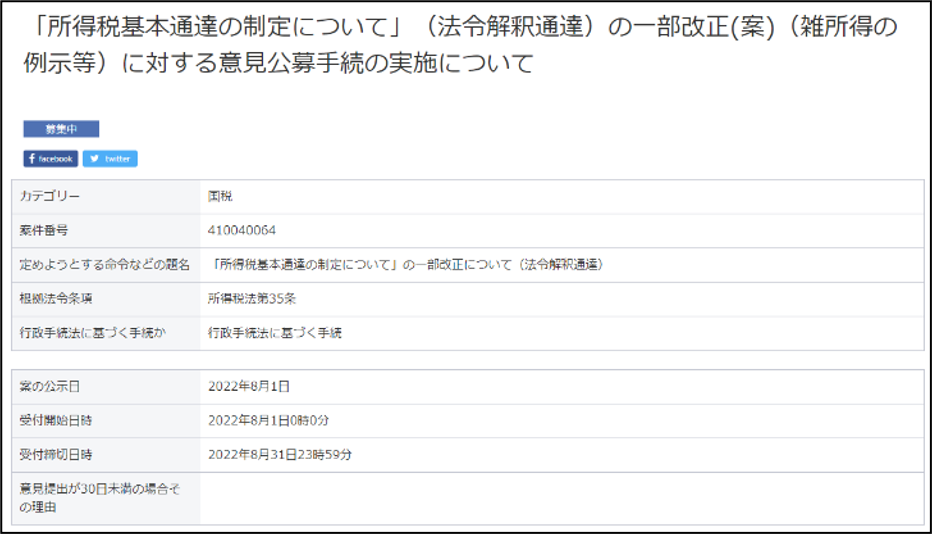



销售额300万日元以下副业是杂项所得
首先
不会有人认为,如果提交了“开业申请”,那么该项业务收就是事业收入吧 ?。其实是否提交“开业申请”是不影响收入种类区分的。
针对副业收入的课税
国税局为了能进行正确申报,在有关共享经济等的“新领域经济活动相关所得”和“副业相关所得”上,正在努力创造更好的申报环境。但是,至今为止关于在这些所得区分的判断上,一直都是难以解决的课题。
比如其中,来自副业的所得基本上被归划入杂项所得。但是,在很多实际情况下,没有达到申报事业所得的要求,却以蓝色申报的形式来申请特别扣除的案例,以及用副业所得所产生的损失去抵扣工资所得来获取退税案例等多有发生。这次发表的修正案似乎,主要是将这2项归相关所得作为重点考虑对象,杂项所得的区分范围更明确化了。
不可与副业所得混合申报
原则上如何判断是「事业所得」还是「雑项所得」,是要看经营范围的活动是否是社会上认可的一般事业来判断的。
偶尔有人认为只要提交 "开业申请",该业务相关收入就会被视为事业所得,其实完全是没有关系的。有关这点,在改正后的修正案规定, "该所得来源不是该个体业主的主要经营项目所得,并且所得金额不超过300万日元",如不是有特别的原因,则归属于 "杂项收所得 "。
换句话说,修订后的规定,收入(销售额)低于300万日元的副业所得将被归类为 "杂项所得",即使将该收入作为事业所得进行申报,可能利用的蓝色申报特别扣除,及与工资所得的收益损失通算,是已经行不通了。
即使收入超过300万日元的,也有不可视为事业所得
必须注意的是,也不是说事业收入所得超过300万,就会自动成为一般正常的"事业所得"。这次的修正案中只是明确规定了300万以下的收入归"杂项所得",但也是能想象得到的,即使超过300万的所得,也是有属于"杂项所得"的。
当收入(销售额)超过300万日元时,原则上讲,是通过看获取此项收入的经营活动是否达到社会所认知的一般业务经营程度,来判断是属于 "事业所得 "还是 "杂项所得"。 还值得关注的是,这项修正案适用于2022年及以后的所得税,因此修正案一经作出,就会影响到今年的纳税年度。
<8月1日付、所得税基本通達に関する改正案の意見募集>

商业发票制度 银行手续费
首先
与银行所产生的业务来往,如何正确的保存因业务来往而产生的发票呢。以其中最频繁产生的汇款手续费进行举例说明。
“只限账簿保存的特例”的适用
通过柜台、ATM机、网上银行进行汇款时,都会产生汇款手续费。这个汇款手续费都是消费税的课税对象,柜台、网上银行的汇款手续费都需要开具发票,要求用户要保存好汇款手续所产生的相关费用的发票。
但是,未满3万日元的ATM汇款所产生的费用,因为开发票比较困难,所以交付发票的义务被免除。这种情况,用户可以通过记载相关事项的会计账簿的保存方式,来抵扣进项消费税。
这就是所谓的,通过自动销售机提供服务时,免除发票交付和保存义务。银行ATM以及兑换机的服务费用,跟自动销售机归属同类,所以消费3万日元未满的情况下,是可以不用开具发票和保存发票的。
因此,可以想象,证明转账的文件小票可以像以前一样通过使用ATM机打印来,但没有必要为了获得已付消费税的抵扣而保存这些文件。这里还需要注意的是,如果是利用窗口和网上银行汇款,手续费即使是不超过3万日币,也需要开具发票和保存的,“只限账簿保存的特例”这里不适用。这样的交易是要正规发票保存的。
“只限账簿保存的特例”的规定
没有开具发票的情况下,如具备“只限账簿保存的特列“,享受抵扣消费税时,需要记载账目来源和对方的住址。
利用ATM机汇款产生的手续费用,ATM的所在地需要记载到账簿上。不需要特意记载支店名,记载住址时需要明确记载市区町村名等。
另外,适用“只限账簿保存的特例”时,在账簿上一定得记载“只限账簿保存的特例”,这点不要忘记遗漏。
如果记载时缺少以下说明栏中的任何一处,在税务调查时被认为不可作为抵扣消费税时,是没有任何办法反驳的。在实际操作上,虽然不是说少记载一项就必须要重现修改纳税申告,一旦被查出就知道这个的重要性,这个重要性是要经历一次税务调查才能真正的了解。
【账簿说明栏的记载图像】
| 摘要 |
| 汇款手续费 (在ABC银行ATM机上汇款:东京千代田区) *适用“只限账簿保存特例”记载 |
融资连带保证人的概念
首先
因该都知道日本有保证人和连带保证人,他们其实有不同的意义。我们要正确理解连带保证人。
保证人和连带保证人
保证人和连带保证人的含义和起到的作用是有区分的。连带保证人与单纯的保证人是有所不同,不具备催告的抗辩权、搜查抗辩权。
催告的抗辩权是指,当债权人(银行)要求保证人履行担保义务(代替作为债务人的公司偿还)时,保证人可以要求债权人首先向主要债务人(获得贷款的公司)要求直接偿还债务这一项权利。
搜查抗辩权是指,在针对没有能力返还的债务,在没有进行实施财产偿还的情况下,保证人是有权拒绝向债权人履行担保义务。
银行融资中的经营者成为连带保证人的情况下,与单纯的保证人不同,没有催告的抗辩权和搜查抗辩权。因此,当公司无力偿还贷款时,银行可以突然向连带保证人提出申请要求偿还。
需要连带保证的原因
银行要求经营者成为连带保证人主要是出于两个原因。
首先是对经营者的纪律。有很多经营者他们,自己的资产不受到一定的损失,就会觉得偿还不了银行的贷款也无所谓的心态。
为公司濒于破产时,一些经营者可能会考虑到,通过给自己设置高薪酬等以便把公司财产转移经营者个人资产。
为了防止这样的道德风险,银行要求经营者成为连带保证人。
其次是为了提高接受贷款的公司的信用的能力。特别是业绩或财务状况不佳,因此而影响了偿还的能力。如果是经营者个人有一定程度的资产,就算不能偿还银行债务,作为连带保证人,可以要求从个人资产去偿还银行的债务。换言之就是经营者拥有自己的资产的话,相对来说比较容易从银行中拿到贷款。
经营者保证人指南
针对经营者是公司法人从银行融资的连带保证人,如何去了解“经营者保证人指南”。
经营者保证人指南启动于2014年2月。经营者保证人指南里,关于经营者个人担保的规定,有以下几点需要我们去了解一下。
- 达到一定的要求,经营者可以无须成为连带保证人。
- 就算经营者是保证人,到在早期决定重组和关闭企业的情况下,是会考虑到经营者最低的生活保障(比如留下生活费,居住的房子等)。
- 在实施保证人的职责时,对于超出个人能力的范围的银行债务时,一般原则是免除。
消除经营者做担保人的有害影响,并鼓励经营者大胆发展业务,快送振兴事业等,认为这个指南是很有一读的价值。



